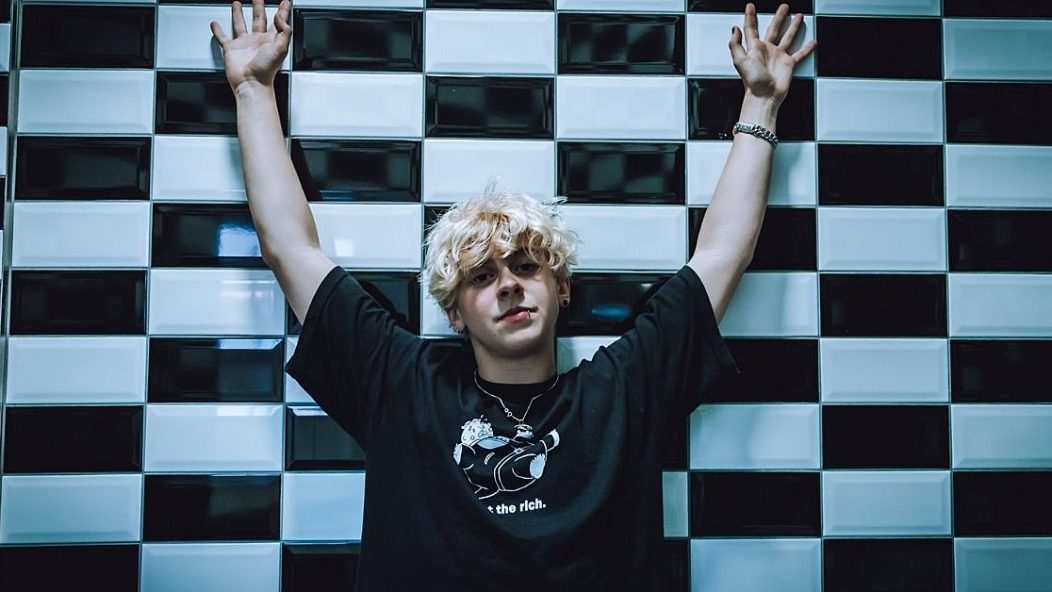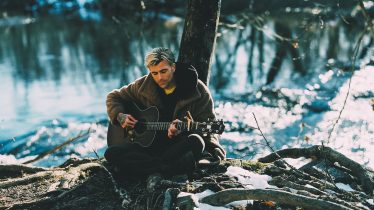
NOAHFINNCE on ‘My Brain After Therapy’: “It's important to really look inside yourself”
Until recently, Noah Finn Adams (aka NOAHFINNCE) had never been to therapy before. When the time finally came to sit down in front of a therapist and spill his guts, he found himself able to join the dots between his present and his past. Traumatic events from a decade ago were still rippling into his 22-year-old self’s behaviors without him being conscious of them. While there was a sense of simultaneous enlightenment and frustration at the things he found on the therapist’s couch, Adams discovered plenty of songwriting inspiration too. My Brain After Therapy, his second EP out June 3, is an open invitation for listeners to press their ears against the door of one of these therapy sessions — but with a side serving of spiky riffs and catchy melodies, he makes it fun.
Read more: NOAHFINNCE on self-care, trans rights and Gen Z activism
How are you feeling about putting the My Brain After Therapy EP out into the world?
I actually feel confident about it this time! For the last EP, I just put any song that I’d written on [there]. So with this one, as soon as I finished writing “Worms (In My Brain),” I knew exactly what I wanted the EP to be and what I wanted it to sound like. I’m excited for it to come out because I’ve been waiting on the song for a good few months now.
The songs on this EP are more thematically tied together than the songs on your first EP, Stuff From My Brain. Would you describe this, then, as a concept EP?
Yeah definitely, in the loosest way possible. It’s just a collection of songs that I wrote after I had therapy. I hadn’t ever had therapy before when I wrote any of the songs on the last EP. Then when started writing, I was like, “Wait, what’s the difference between now and then? I went to therapy!” Therapy is a great place to take us on ideas.
This EP is called My Brain After Therapy. So what does happen to your brain after therapy?
Maybe a bit less stressed, but also a bit more reflective. But I guess it made me a bit frustrated because therapy was good for understanding why my brain works the way it does and why I have certain behaviors in the past. But also, the most annoying thing about going to therapy is being like, “Hey, therapist, I have acknowledged this thing from my past. I would like to heal from it now.” And it’s not as simple as that. I guess I’d say I have [a better understanding of myself], but also, I’m a bit more pissed off.
As you mentioned, you opened your new era with “Worms (In My Brain).” Where did the worm metaphor that the song revolves around come from?
Saying someone has worms for brains means they’re stupid. When I was thinking of writing a song and I’d had a few therapy sessions, I read a quote very soon after the start of my sessions, something about the imagery of worms eating away at your brain being similar to trauma. I’d go to therapy, realize that so much of my life and so much of the things that I stress about and so many of my behaviors nowadays are from trauma that happened 10, 12 years ago. So I guess it was just the idea that these worms are hacking at my brain, eating away at it and stopping me from being able to do things that maybe I should be able to do at this point in my life.
Lyrically, this EP’s a lot darker than your previous one. How much of that was a conscious decision?
I mean, I guess it was a conscious thing. But it’s only like, I guess it was just because I knew where I was writing from this time because after I wrote “Worms…” I was like, “OK, that’s where we’re going with this.” So I guess it was a conscious decision that I knew that I’d be writing about stuff that happened in my past, maybe more than last EP because that one was very much about being overwhelmed, whereas this one [involved more] reflecting on stuff, so it was gonna be darker. But the idea was never to be like, throwing together a bunch of dark songs. It was just these are the things that I discussed in therapy. And that’s just how they ended up being written.
How much do you feel like you’ve evolved sonically as an artist since your first EP?
A lot, I think, but it’s mostly down to the fact that I am more used to doing this because when I wrote my first EP, some of those songs were the first that I’ve ever written. I didn’t really know where I was going when I wrote them. Whereas now, I’ve had a few shows, I’ve done a few interviews, have made a few music videos, and I know more, what I like and what I don’t like, and maybe what I’m good at, and maybe not so good. So I think I just have a bit more experience, and I feel a bit more confident. When it comes to sound, I’m more confident to just be like, “Yeah, let’s fucking have this weird shit!” But I think it’s mostly just confidence because I’m very new to this stuff.
You brought Hot Mulligan on board for “After Therapy.” How did that collaboration come about?
It’s an interesting story, to be honest. We were just like, “This will be a really good song to have a collaboration with,” and then we were like, “Wait, Hot Mulligan!’”My label was just like, “Hey, Hot Mulligan want to be on this!” It was a crazy story. It was just that I really liked that music, and I think Chris [Freeman’s] voice works really well with the song. He adds a lot of grit that I wish my voice had. So that’s the entire story. I even got my mom into listening to them! It wasn’t even on purpose. I was like, “Oh yeah, I’ve got a feature with Hot Mulligan.” I showed her the song, she went through their Spotify, and she was like, “They’re really good, aren’t they?”
What are you hoping someone approaching this EP might take away from it, especially when you’re openly discussing an important part of mental health that isn’t as often spoken about?
I guess I just want people to take away the fact that I think it’s important to really look inside yourself at the kind of person you are. Obviously, I’d love to say the message is “Go to therapy fucking now” because I think a lot more people need therapy than the amount of people that actually think they need therapy. But I guess I just want people to think, “Oh, I should be more honest with myself” and self-reflect more and that it’s OK to be vulnerable. It’s not really just my experience, but I hope people can see themselves in it.
You’ve got two EPs to your name now. When might it be time for the debut album?
I don’t know. To be honest, I guess that’s probably what’s coming next. I’m not entirely sure. But that seems terrifying. I feel like writing an EP is not easy [as such], but with the amount of songs that’s on it, it’s maybe easier to get a general vibe. But I’m not sure. I mean, I guess that’s coming next. I’m not sure how soon…










